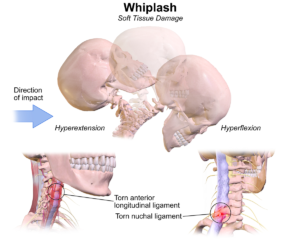“My goodness! I was only involved in a minor fender-bender! Why does my neck still hurt so badly?” If you have said this to yourself or others recently, you have probably experienced whiplash.
[su_spacer]
What is “Whiplash”?

The term “whiplash” is used to refer to:
- the hyperextension/hyperflexion injury of the neck, and
- the resulting symptoms of this injury.
This forwards-flexion and/or backwards-extension of the neck essentially results in a soft tissue sprain/strain injury to the structures within the cervical (neck) and upper thoracic spinal regions (upper back). The most common cause of whiplash is from a motor vehicle accident.
When the initial impact occurs and the head is forced in either excessive flexion (head thrown backwards) or excessive extension (head thrown forwards), protective reflexes cause the muscles of the neck to forcefully contract which “whips” the head back in the opposite direction. The resulting injury often leads to numerous symptoms, many of which are confusing and poorly understood.
[su_spacer]
The Statistics Tell it All
On average, there are more than 6 MILLION car accidents on the US roads annually. Here are some crazy statistics you should know about car accidents and whiplash:
- Studies involving live humans have demonstrated that a motor vehicle accident of as little as 5 mph can induce cervical (neck) injuries such as whiplash.
- Whiplash symptoms last more than 6 months in 75% of all patients.
- Symptoms of whiplash commonly do not appear until weeks or months after the accident.
- Whiplash victims lose an average of 8-weeks of work due to their injuries and the necessary treatment.
- Whiplash is 5 times more common in women than in men, but can obviously occur in both sexes.
- The most common cause of cervical spine damage – like whiplash – is rear-end collisions involving motor vehicles.
[su_spacer]
Do I Have Whiplash?
Symptoms following an accident include:
- neck pain, tenderness, achiness and stiffness
- cervical muscle spasms
- tenderness and nodules in superficial cervical musculature
- cervical reduced range of motion
- post-traumatic headaches (including migraine and muscle-tension headaches)
- shoulder and interscapular pain
- hand and finger pain, numbness and tingling
- blurred vision
- difficulty swallowing/feeling of lump in throat
- dizziness and balance problems
- lightheadedness
- post-traumatic depression and cognitive problems (also known as Mild Traumatic Brain Injury or MTBI)
All of the above are simply symptoms of whiplash. You need to speak to a healthcare provider to confirm any and all diagnoses.
[su_spacer]
What do I do now?
Call the lawyers at Haun Mena. We will work with you and your medical providers to ensure that you are given the medical treatment you need to get back on your feet. We will also make sure the driver that hit you is held accountable and that you are provided the justice you and your family deserve.
Remember, you don’t pay us a dime – Not. One. Cent. – unless we recover from the at fault party on your behalf. Call now or contact us for your free consultation.





